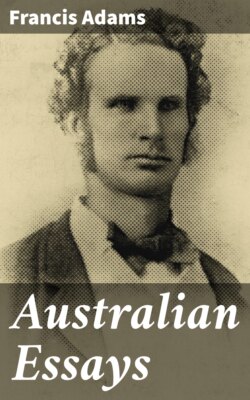Читать книгу Australian Essays - Adams Francis William Lauderdale - Страница 3
На сайте Литреса книга снята с продажи.
PREFACE.
ОглавлениеTable of Contents
It would be absurd to suppose that it will not seem clear, to whatever readers this little book may find here, that one of the principal characters of the Dialogue is a man for whom we all, I think, feel more interest, admiration, and respect than any other among us. That this is so in reality, I must beg to deny, and I hope that, when I state that I neither have myself, nor know anyone who has, the honour of his acquaintance—nay, that I have never even seen him—I hope that I shall stand acquitted of all charges of personality. As for the other characters, there will too, I daresay, be found people ready to declare who are the originals, and to explain everything which is inconsistent with their theory by ascribing it to designed mystification on the part of the Author. For this, it seems, is an occupation like another. The Author believes that so much of a man’s life as is public belongs to the public, and is at the fair use of the public’s literary analysts, videlicet the critics, and that it is by no means an unfair use, to take such a life and freely present it in that individual form which it actually has to us in our moments of imagination and reflection. It seems, then, to him foolish, in considering, (to take it in the form of a well-known example), a book like D’Israeli’s “Lothair” or “Endymion,” to be trying to identify the characters with actual men. D’Israeli simply uses as much of actual men and actual events as he requires for his criticism of the time he is portraying, and is careless of the rest. I see here no attempt at mystification. I simply see an artist picking out the choicest materials he has to hand.
As regards both the Dialogue and the Essays, I would like to point out that they are professedly didactic, and, as such, are of course cast into the form which I believe most calculated to achieve their object. I am sure that I have neither the intention nor the wish to impugn the competency of the australian Press to deal with things australian. I am myself a member, a very humble member of it, and am quite ready to do myself the sincere pleasure of praising it. At the same time I cannot blind myself to the fact that its criticism is not (let us say) ideal. The “business of criticism,” says the first of living critics, “is simply to know the best that is known and thought in the world, and by in its turn making this known, to create a current of true and fresh ideas.” Well now, I cannot, I say, look upon this australian Press, of which I am so humble a member, as the creator of such a current; and, (I will make a clean breast of it at once!), bright and charming as I have always found him in the “Echoes of the Week” and places of like resort, I have viewed the triumphal approach of Mr. Sala to us, and his even more triumphal progress among us, with (as someone will presently be saying of me)—“with a jaundiced eye.” And why? The truth, the real truth, is, (May I be forgiven for saying so?), that I do not believe that even Mr. Sala can help us australian pressmen, (since I dare to place myself in a company which includes such stupendous personages as “The Vagabond” and the Editor of the Melbourne Herald), to create that “current of true and fresh ideas” to which we have alluded. Truth, alas, is the private property of no man—not even of Mr. George Augustus Sala. And I confess to finding myself at the point of wishing that, even for mere variety’s sake, we should hear more than we do of the ideas of such personages as Goethe, Emerson, Renan, Arnold, and so on: writers, of course, familiar to us all, and whom I, at any rate, must still continue to consider as not wholly exhausted. They may not have the depth of thought, the accuracy of detail, the exquisite tact of expression which distinguish the genial littérateur, and make his work, as one of my fellow pressmen said the other day, “epoch-making,” but I really do still continue—I must still continue—to think that, despite all these disadvantages, they are still capable of helping us a little to that critical haven where our souls would be—to the source of “a current of true and fresh ideas.”
September, 1885.
